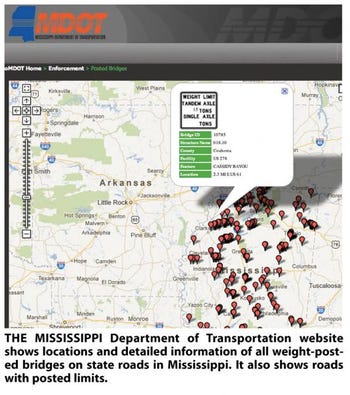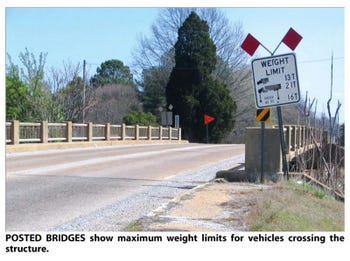
Mississippi authorities will be checking for overweight grain trucks
“We’ve had a lot of calls about overweight trucks running in and out of grain elevators all over the Delta and damaging state and county roads,” says Maj. Dennis Hopper, MDOT Office of Enforcement at Batesville, Miss. "MDOT Chief Willie Huff has received complaints about trucks coming into elevators weighing 100,000 to 120,000 pounds, and he is stressing that we’re going to focus on these overweight trucks."

With corn and soybean harvest getting under way in Mississippi, officials with the Mississippi Department of Transportation are warning that grain trucks will be under close scrutiny for overweight loads.
“We’ve had a lot of calls about overweight trucks running in and out of grain elevators all over the Delta and damaging state and county roads,” says Maj. Dennis Hopper, MDOT Office of Enforcement at Batesville, Miss., who spoke at the joint annual meeting of the Southern Cotton Ginners Association and the Delta Council Ginning and Cotton Quality Committee.
“MDOT Chief Willie Huff has received complaints about trucks coming into elevators weighing 100,000 to 120,000 pounds. During one recent check, our officers wrote 10 or 12 overweight tickets, which would indicate there is quite a bit of this going on.”
The last three years, Hopper says, MDOT officers have concentrated on enforcement of posted bridge weight limits during harvest season, “but this year Chief Huff is stressing that we’re going to focus on these overweight trucks.
“We are going to be working closely with farmers and contract haulers, and we hope they will work with us to comply with the weight restrictions on state roads in the Delta, and posted weight limits on county roads as well.” Hopper says farmers and truckers need to be aware of all the regulations related to transportation of crops on the state’s roads, including posted weights for bridges and roads, as well as permits needed for operating vehicles in the state, and regulations pertaining to dyed fuel.
“We now have about 230 posted bridges throughout Mississippi on state highways — and that doesn’t count county or city roads that may be posted. The Batesville district that I work has 110 posted bridges and the Tupelo district has about 50 — about two-thirds of the state’s total.
“Our officers are out working these areas, and if you see them sitting by a posted bridge and you’re overweight, they may write a warning ticket the first time, but if it’s a serious violation they can write you a court ticket.”
All posted bridges can be checked online at the agency’s website, Hopper notes. “You can go to gomdot.com and click on the ‘Posted Bridges’ link and and it will give you all the information about that bridge, including location, bridge ID number, truck weight limit and limits per axle — tandem, single, etc. Or you can telephone our offices anywhere in the state and we’ll try and help you any way we can. The website is updated at least weekly, sometimes daily, as conditions change for these bridges.”
Decades-old bridges
Most of the bridges that are posted with weight limits are anywhere from 40 years to 70 years old, he says. “Many of these were built with wooden pilings that are in various stages of decay. They need to be replaced, but in today’s economy we can’t get the money to replace all of them — it just has to be done on a piecemeal basis as money is made available by the legislature.
“Three years ago, we had 400-plus posted bridges in the state, and we asked the legislature for $300 million for bridge upgrades, but with a very tight state budget we got $100 million. In many cases, all the state can do is try to keep the bridges repaired and keep them posted for weight limits in order to try and avoid damage.
“For most of them, it’s an ongoing maintenance/repair situation. The inspection process is ongoing and bridges are posted on the basis of those findings, and posted limits are changed as the condition of the bridge changes.”
In one instance, Hopper says, vandals used a cutting torch to remove sections of steel bridge supports. “It was so damaged, it’s a wonder the bridge was still standing. People also take down the posted signs, but the weight limits still apply, so it’s advisable that you check all the bridges on the roads you’ll be traveling.
“If one of your trucks should cause a bridge to fall in, there could be injuries or even deaths, not to mention long-term inconvenience to people traveling in the area daily. Your liability could be enormous.”
A few years back, Hopper says, an old bridge over a river collapsed from an overweight log truck. “Thankfully, there were no injuries, but it was a major inconvenience to people traveling in that area — and it was very costly to the owner of the truck and the driver.”
Out-of-state trucks operating in Mississippi must have an apportioned tag from their home state, he says; if not, they must have a three-day permit or a temporary Mississippi tag, which can be for three months or six months.
“This works well for people coming in and doing custom harvesting over an extended period. They also need to buy fuel in the state and pay taxes in the state. We will be checking to be sure they’re buying fuel in the state. Drivers must also have a CDL and trucks must be properly insurance. Violations could delay delivery of your products and increase roundtrip times.”
Harvest permits available
A harvest permit may be obtained that is vehicle specific and is good for one year, Hopper says. It allows a gross weight of 84,000 pounds for proper axle and length configurations. They may be issued to out-of-state trucks with an apportioned tag or a temporary Mississippi tag. Application forms for these permits may be obtained on the MDOT website.
“It’s important to know that no permit allows an overweight truck to cross a posted bridge,” he says. “If a bridge is posted, that posted weight overrules everything else — it doesn’t matter what your harvest permit says, the posted limits apply.”
It is illegal, Hopper notes, to use on-farm dyed fuel in any vehicle traveling on the state’s roadways.“This is to helpreduce tax evasion by identifying fuel on which excise taxes have not been paid, and to help reduce air pollution by identifying fuel not suitable for use in motor vehicles.
“There is a $2,000 minimum penalty — $1,000 from the state, $1,000 from the Internal Revenue Service — and it can be much higher, depending on circumstances.”
Any visible evidence of dye may result in a penalty, Hopper says, and mixing dyed fuel with regular fuel makes the entire load unsuitable for highway use and subject to penalties.
“We’ll pull a fuel sample and if it’s dyed, we send it to the IRS and they’ll bill you at as much as $10 per gallon; if you’ve got 300 gallons in the tank, that’s $3,000 to the IRS and $3,000 to the state.
“If your driver tells us he got it out of the tank on your farm, we’ll come to your farm, check the number of gallons in your tank, and you’ll pay a per-gallon fine for that. I know of one company that got a $70,000 bill for a violation.”
Mixing dyed fuel with undyed fuel makes the entire load illegal for highway use and subject to penalties, Hopper says.
“Some companies tell us they mix transmission fluid with their diesel to help keep fuel injectors clean. You should be aware that transmission fluid has the same dye as dyed fuel, and it can contaminate your diesel and put you in violation of dyed fuel regulations.”
There have been reports, he says, of thieves going onto farms and stealing dyed diesel fuel. “We will try and help when we can, but we can only try and catch them on the road. The Mississippi Department of Agriculture and Commerce has personnel to actually investigate these cases, so you may want to work with them on any theft of dyed fuel.”
Our website also has a map showing truck weight limits for state roadways, Hopper says. “It is continually updated, and you can use it to check low weight roads and warn your drivers to avoid those roads. The 4,000 harvest weight permit does not apply on these roads. If we catch someone in a violation, it can be expensive. The website also has information about all the permits and application forms.”
In addition to the state roads and bridges that have posted weight limits, Hopper says farmers and truckers should be aware that counties also have weight limits on some of their roads and bridges, and “you would do well to check on this to be sure you’re in compliance all along your route of travel.”
About the Author(s)
You May Also Like



